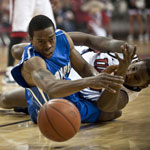“It’s important to keep trying to do what you think is right no matter how hard it is or how often you fail. Never stop trying” – John Wooden
 If, despite your best efforts, you can’t overcome difficult situations, frustration can become an even more destructive emotion.
If, despite your best efforts, you can’t overcome difficult situations, frustration can become an even more destructive emotion.
In fact, if frustration isn’t dealt with quickly and positively, it can trigger what sports psychologist call the “negative emotional chain” in which the frustration leads to a descent into a series of truly unhealthy emotions and a serious decline in performance.
Unfortunately, more often than not, anger can turn into an emotion that hurts your mental game in basketball.
The feelings of anger are like those of frustration, but with the volume turned way up.
Your body becomes tense; you lose your coordination, and the quality of your efforts decline.
Your focus narrows so much that you miss important cues during a competition. And your ability to think becomes clouded by the anger, so you aren’t able to make good competitive decisions.
Despite the powerful influence that frustration has on your training and competitive game, you probably never were taught how to deal with your frustration in a constructive way.
Your goal is to learn to stop the negative emotional chain by responding positively to the frustration when it first arises.
Dealing with emotions is crucial – Moments of panic, anxiety, and emotional ups and downs can interfere with the physical performance at every level. Athletes, who continue to perform with some degree of consistency despite of their feelings of anxiety, have learned to cope in one way or another. Relatively few athletes, however, have been taught skills and strategies that would enable them to cope and maintain consistency in performance.
There are many resources that look at the issue of mindset but, not surprisingly, when you start to deal with the sports psychology for basketball, there is no ‘one-fits-all’ answer and different individuals will need to adopt different approaches to find out what is right for them.
Develop a positive mindset – Mindset should be considered the intangible X-factor that can strongly determine your competitive success or failure. Different athletes have different personalities that affect their mindsets, but the good news is that the specific mental skills that contribute to success in basketball can all be learned and can be improved with instruction and practice. If you want to improve your chances of success with a positive mindset, here are some basketball mental skills techniques you should adopt:
- Develop a positive attitude and view sport as an opportunity to compete against yourself and learn from your successes and failures.
- Have the motivation to be able to persist through difficult tasks and difficult times to ensure the rewards and benefits are achieved.
- Set long-term and short-term goals that are realistic, measurable, and time-oriented.
- Stay committed to these goals.
- Maintain their self-confidence during difficult times with realistic, positive self-talk.
- Prepare for competition by imagining yourself performing well in competition, preparing for action, and recovering from errors.
- Learn how to maintain focus and resist distractions, whether they come from the environment or from within.
Learning these techniques will help you create a more positive mindset and as a consequence of feeling better about yourself and more confident in your outlook, you are more likely to enjoy your experience and achieve your goals.
* Download the free mental game assessment and get started on Improving your Mental Game in Basketball.
